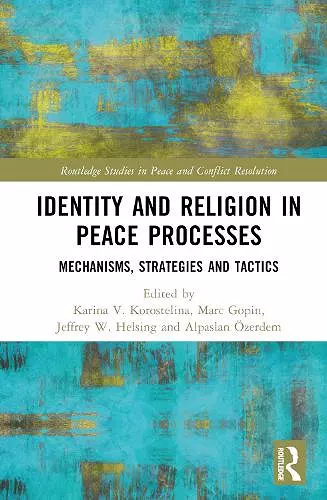Identity and Religion in Peace Processes
Mechanisms, Strategies and Tactics
Marc Gopin editor Jeffrey W Helsing editor Alpaslan Özerdem editor Karina V Korostelina editor
Format:Hardback
Publisher:Taylor & Francis Ltd
Published:1st Aug '24
Currently unavailable, and unfortunately no date known when it will be back

This book examines the complex role identity and religion play in global peace processes.
Based on multiple case studies, this book unveils the complex role identity and religion play in peace processes across the globe. It demonstrates that the success and sustainability of a peace process depends on the systemic application of the BRIDGE model that is introduced here. This model describes five major strategies (Bonding, Reassuring, Involving, Determining Guides, and Equalizing) and numerous tactics for how peace processes and accords can deal with the central issues as well as important common challenges that run through identity-based ethnonational or religious conflicts. This represents the first comprehensive account of how the transition from enemies to neighbors is achieved and how intergroup relations and engagement are transformed in peace processes, impacting power, access to resources, legitimacy, and representation in national identity. The model also discusses what forms of peacebuilding authentically represent the interests, needs, and values of religious constituencies, and what can be learned from how religious constituencies escalate and de-escalate conflict. The book demonstrates why religion must also be included in peace processes and permanent solutions, owing to religion’s capacity to enhance commitment to bonding and peaceful values, such as justice, compassion, nonviolence, stability, care for children, and care for the environment, for the sick, the wounded, the traumatized, and the bereaved.
This book will be of much interest to students of peace studies, intra-state conflict, religion studies, and International Relations.
'This innovative and important book argues that successful peace processes must transform relations between groups. It is the first comprehensive and systematic study of the role of identity and religion in peace processes, and it provides a compelling account of how the transition from enemies to neighbours can be achieved. The book combines theoretical sophistication with rich case studies and is a must-read for scholars, students, and policymakers with an interest in peace processes.'
Nina Caspersen,University of York, UK
'Identity and Religion in Peace Processes is a much-needed contribution to debates on how and why some peace processes manage to transform relations between different groups in conflict and others do not. This book sharpens our focus on the role of identity and religion not just in conflicts, but in peace processes, and explores the approaches and mechanisms by which these were addressed, with varying levels of success, in a range of contemporary case studies. The insights this collection yields will be of great interest and value to scholars and peacemakers alike.'
Jasmine-Kim Westendorf, La Trobe University, Australia
'This book fills a critical gap with which our field has long struggled; the issue of religion in protracted conflicts. We have always known that religion is a central issue in many such conflicts, but we have not had a tool with which to approach it effectively in both practical and theoretical terms. The BRIDGE model introduced in this book gives us that tool. This is an important book.'
Peter Jones, University of Ottawa
ISBN: 9781032784236
Dimensions: unknown
Weight: 810g
340 pages